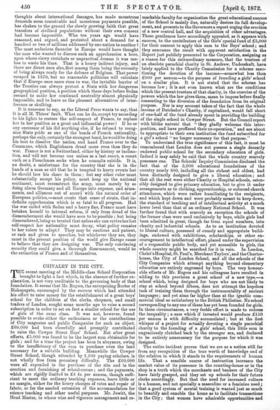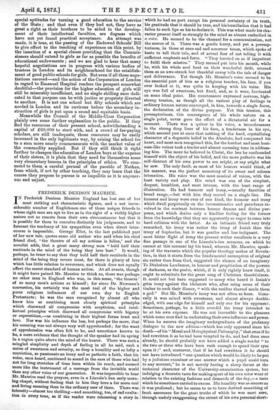CHIVALRY IN THE CITY. rE recent meeting of the Middle-class School
Corporation brought to light a fact which, in the absence of further ex- planation, is not very creditable to the governing body of that foundation. It seems that Mr. Rogers, the enterprising Rector of Bishopsgate, encouraged by the success which had attended his effort to raise money for the establishment of a great boys' school for the children of the clerks, shopmen, and small traders of London, sought some months ago to raise a second subscription in order to set on foot a similar school for the use of girls of the same class. It was not, however, found possible to evoke either the enthusiasm or the contributions of City magnates and public Companies for such an object. £60,000 had been cheerfully and promptly contributed to raise the Cowper Street Boys' School. But after great efforts, £5,000 was found to be the largest sum obtainable for girls ; and for a time the project has been in abeyance, owing to the insufficiency of the sum to purchase even the land necessary for a suitable building. Meanwhile the Cowper Street School, though attended by 1,100 paying scholars, is not wholly free from pecuniary difficulty. The £60,000 were all expended in the purchase of the site and in the erection and furnishing of school-rooms ; and the payments, which are rigidly limited to £4 4s. per annum, though suffi- cient to meet the ordinary teaching expenses, leave little or no margin, either for the heavy charges of rates and repair of fabric, or for the needed extension of the accommodation for faience teaching and other useful purposes. Mr. Jowitt, the Head Master, to whose wise and vigorous management and re- markable faculty for organization the great educational success of the School is mainly due, naturally desires its full develop- ment, and presents to the Governors a report urging the erection of a new central hall, and the acquisition of other advantages. Those gentlemen have accordingly appealed, as it appears with success, to the contributors of the Girls' special fund of £5,000 for their consent to apply this sum to the Boys' school ; and they announce the result with apparent satisfaction in the Report just publicly presented to the Corporation, assigning as a reason for this extraordinary measure, that the trustees of an obsolete parochial charity in St. Andrew, Undershaft, have lately applied to the Charity Commission for a scheme sanc- tioning the devotion of the income—somewhat less than £900 per annum—to the purpose of founding a girls' school on a similar plan. It is not stated that the scheme has become law ; it is not even known what are the conditions which the present trustees of that charity, in the exercise of the powers which the law gives them, mean to impose before finally consenting to the diversion of the foundation from its original purpose. Nor is any account taken of the fact that the whole income of Datchelor's Charity, if capitalized, would fall short of one-half of the fund already spent in providing the building of the single school in Cowper Street. But the Council report with blithe naiveté that "they gladly welcome this inter- position, and have proffered their co-operation," and are about to appropriate to their own institution the fund subscribed for a girl's school "no longer necessary for that purpose."
To understand the true significance of this fact, it must be remembered that London does not possess a single decently endowed public school for the secondary education of girls.
Indeed it may safely be said that the whole country scarcely possesses one. The Schools' Inquiry Commission disclosed the fact that of the 3,000 educational foundations of the country nearly 800, including all the richest and oldest, had been distinctly designed to give a liberal education ; and that all the rest were either Charity or Hospital schools, osten- sibly designed to give primary education, but to give it under arrangements as to clothing, apprenticeship, or enforced church attendance, which were rather humiliating to the recipients, and which kept down and were probably meant to keep down, the standard of teaching and of intellectual activity at a much lower level than that of an ordinary National School. It was further found that with scarcely an exception the schools of the former class were used exclusively by boys, while girls had been admitted in great, though far from equal numbers, into charity and industrial schools. As to an institution devoted to liberal culture, possessed of comely and appropriate build- ings, endowed with exhibitions, scholarships, or other en- couragement to intellectual effort, placed under the supervision of a responsible public body, and yet accessible to girls, the whole country might be searched for it in vain. In London, Christ's Hospital, St. Paul's, Merchant Taylors', and the Charter- house, the City of London School, and all the schools of the City Companies which attempt anything beyond elementary education are entirely engrossed by boys. The very honour- able efforts of Mr. Rogers and his colleagues have resulted in adding to this provision a great school of a new type,—a school which, being designed for boys who are not likely to stay at school beyond fifteen, does not attempt the hopeless task of training them through the instrumentality of ancient languages ; and yet aims far higher than at the ignoble com- mercial ideal so satisfactory to the British Philistine. No school corresponding to anyone of these has yet been founded for girls. In these circumstances, a very feeble effort is made to redress the inequality ; a sum which if invested would produce £150 per annum is with difficulty accumulated ; but at the first whisper of a project for actually devoting a single parochial charity to the founding of a girls' school, this little sum is ungraciously clutched back by the stronger sex, and declared to be entirely unnecessary for the purpose for which it was designed.
The entire incident proves that we are as a nation still far from any recognition of the true worth of knowledge and of the relation in which it stands to the requirements of human life. That a sensible course of instruction increases the market value of its possessor in the counting-house or in the shop is a truth which the merchants and bankers of the City have fairly grasped, and they set up schools for their future clerks accordingly. But that the need for increased culture is a human, and not specially a masculine or a feminine need ; that a good system of mental training is wanted just as much to beautify and ennoble the home as to facilitate transactions in the City ; that women have admirable opportunities and
special aptitudes for turning a good education to the service of the State ; and that even if they had not, they have as great a right as their brothers to be aided in the develop- ment of their intellectual faculties, are dogmas which have not yet found practical acceptance. An attempt was made, it is true, at the passing of the Endowed Schools' Bill to give effect to the teaching of experience on this point, by the insertion of a special clause providing that the Commis- sioners should extend to girls as far as possible the benefits of educational endowments ; and we are glad to hear that many hopeful negotiations are in progress with various bodies of trustees in London and its neighbourhood for the establish- ment of good public schools for girls. But even if all these nego- tiations succeed—and the action of the Corporation of London in regard to Emanuel Hospital renders the prospect somewhat doubtful—the provision for the higher education of girls will still be miserably insufficient, and no single shilling once dedi- cated to that purpose can be with justice or propriety diverted to another. It is not one school but fifty schools which are needed in London and its environs before the secondary in- struction of girls is put upon a sound and equitable basis.
Meanwhile the Council of the Middle-Class Corporation plainly owe some further explanation to the public. If they fmd the resources of their present school, notwithstanding a capital of £60,000 to start with, and a crowd of fee-paying scholars, are still inadequate, those resources may be easily increased in the only legitimate way, by raising the school fee to a sum more nearly commensurate with the market value of the commodity supplied. But if they still think it right further to cheapen the education of London boys at the expense of their sisters, it is plain that they need for themselves some very elementary lessons in the principles of ethics. We com- mend to them a careful perusal of the parable of Nathan, from which, if not by other teaching, they may learn that the course they propose to pursue is as impolitic as it is ungener- ous and unjust.



































 Previous page
Previous page